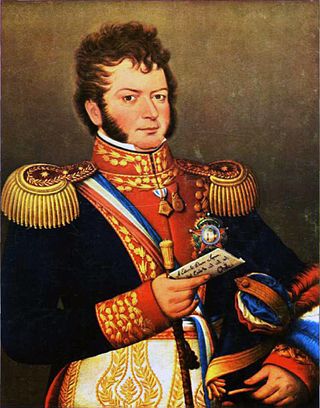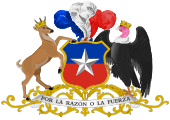
The flag of Chile consists of two equal-height horizontal bands of white and red, with a blue square the same height as the white band in the canton, which bears a white five-pointed star in the center. It was adopted on 18 October 1817. The Chilean flag is also known in Spanish as La Estrella Solitaria.

Bernardo O'Higgins Riquelme was a Chilean independence leader who freed Chile from Spanish rule in the Chilean War of Independence. He was a wealthy landowner of Basque-Spanish and Irish ancestry. Although he was the second Supreme Director of Chile (1817–1823), he is considered one of Chile's founding fathers, as he was the first holder of this title to head a fully independent Chilean state.

José Miguel Carrera Verdugo was a Chilean general, formerly Spanish military, member of the prominent Carrera family, and considered one of the founders of independent Chile. Carrera was the most important leader of the Chilean War of Independence during the period of the Patria Vieja. After the Spanish "Reconquista de Chile" ("Reconquest"), he continued campaigning from exile after defeat. His opposition to the leaders of independent Argentina and Chile, San Martín and O'Higgins respectively, made him live in exile in Montevideo. From Montevideo Carrera traveled to Argentina where he joined the struggle against the unitarians. Carreras' small army was eventually left isolated in the Province of Buenos Aires from the other federalist forces. In this difficult situation Carrera decided to cross to native-controlled lands all the way to Chile to once and for all overthrow Chilean Supreme Director O'Higgins. His passage to Chile, which was his ultimate goal, was opposed by Argentine politicians and he engaged together with indigenous tribes, among them the Ranquel, in a campaign against the southern provinces of Argentina. After the downfall of Carrera's ally, the Republic of Entre Ríos, and several victories against the United Provinces of the Río de la Plata, Carrera's men were finally defeated by numerically superior forces near Mendoza. Carrera was then betrayed by one of his Argentine helpers, leading to his capture and execution in that city.

Ramón Saturnino Andrés Freire y Serrano was a Chilean political figure. He was head of state on several occasions, and enjoyed a numerous following until the War of the Confederation. Ramón Freire was one of the principal leaders of the liberal Pipiolo movement. He has been praised by historian Gabriel Salazar as the most democratic leader of the early republican period in Chile.

Fernando de Errázuriz y Martínez de Aldunate, also known as Fernando Errázuriz Aldunate, was a Chilean political figure. He served as provisional president of Chile in 1831.

Rancagua is a city and commune in central Chile and part of the Rancagua conurbation. It is the capital of the Cachapoal Province and of the O'Higgins Region, located 87 km (54 mi) south of the national capital of Santiago.

The Battle of Chacabuco, fought during the Chilean War of Independence, took place on February 12, 1817. The Army of the Andes, from the United Provinces of the Río de la Plata and led by Captain–General José de San Martín, defeated a Spanish force commanded by Rafael Maroto. This victory was a significant defeat for the Captaincy General of Chile, the royalist government established after the division of the Viceroyalty of Peru.

Joaquín Prieto Vial was a Chilean military and political figure. He was twice President of Chile between 1831 and 1841. Joaquín Prieto was of Spanish and Basque descent.

The Chilean War of Independence was a military and political event that allowed the emancipation of Chile from the Spanish Monarchy, ending the colonial period and initiating the formation of an independent republic.

The Crossing of the Andes was one of the most important feats in the Argentine and Chilean wars of independence. A combined army of Argentine soldiers and Chilean exiles crossed the Andes mountains, which separate Argentina from Chile, to invade Chile, leading to its liberation from Spanish rule.

O'Higgins was a Chilean frigate famous for her actions under Captain Lord Cochrane.

Hipólito de Villegas y Fernández Manzanares was a Chilean political figure, who participated actively in the war of independence in that country, and served as its first Minister of Finance.

Spanish Reconquest or just Reconquest is the name of a period of Chilean history that started in 1814 with the royalist victory at the Battle of Rancagua and ended in 1817 with the patriot victory at the Battle of Chacabuco. During this period, the defenders of the Spanish Empire reestablished their dominion in Chile after said country had separated itself from the Spanish Crown, installed its First National Government Board in 1810—the first institution of self-government in Chile, created its First Congress National in 1811 and subsequently elected its first supreme director, Francisco de la Lastra, in 1814.

The Chilean Declaration of Independence is a document declaring the independence of Chile from the Spanish Empire. It was drafted in January 1818 and approved by Supreme Director Bernardo O'Higgins on 12 February 1818 at Talca, despite being dated in Concepción on 1 January 1818. The ceremony of independence was performed on 12 February 1818, the first anniversary of the Battle of Chacabuco.

New Fatherland was a period in the history of Chile that began with the victory of Ejército de los Andes in the Battle of Chacabuco on 12 February 1817 and ended with the resignation of Bernardo O'Higgins as Supreme Director in 1823.

The First Chilean Navy Squadron was the heterogeneous naval force that terminated Spanish colonial rule in the Pacific and protagonized the most important naval actions of in the Latin American wars of independence. The Chilean revolutionary government organized the squadron in order to carry the war to the Viceroyalty of Perú, then the center of Spanish power in South America, and thus secure the independence of Chile and Argentina.

Chile–Spain relations are the current and historical relations between Chile and Spain. Both nations are members of the Association of Spanish Language Academies, Organization of Ibero-American States, Organisation for Economic Co-operation and Development and the United Nations.

The Legion of Merit of Chile, frequently abbreviated to the Legion of Merit or the Legion, was a Chilean multi-class order of merit established on 1 June 1817 by Bernardo O'Higgins to recognise distinguished personal merit contributing to the independence of Chile or to the nation. Membership of the Legion conferred a variety of privileges in Chile and its members were entitled to wear insignia according to the class conferred. The Legion of Merit of Chile was abolished in 1825.
The following lists events that happened during 1817 in Chile.

Chile–Ireland relations are foreign relations between Chile and Ireland. Both nations are members of the Organisation for Economic Co-operation and Development and the United Nations.


















